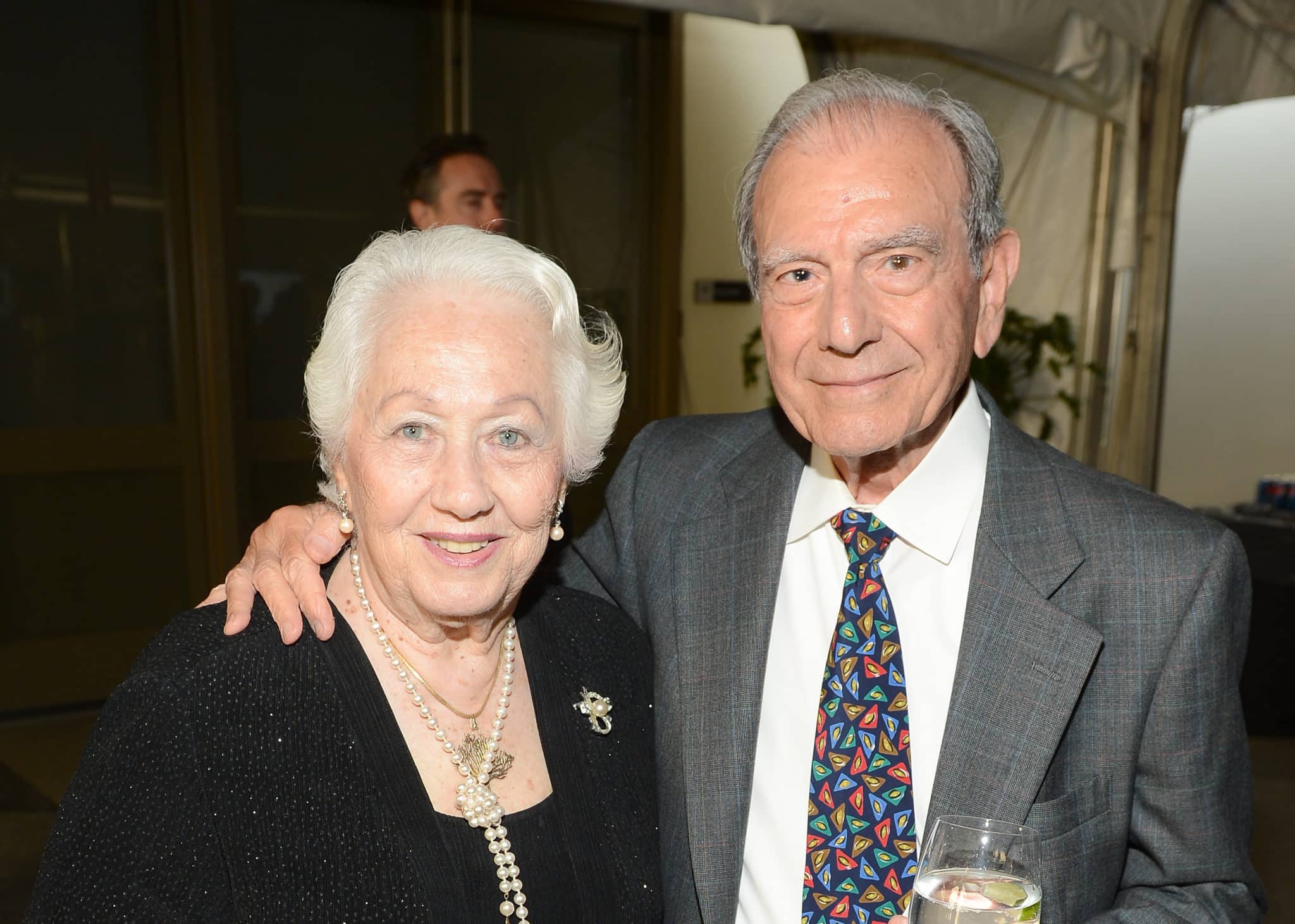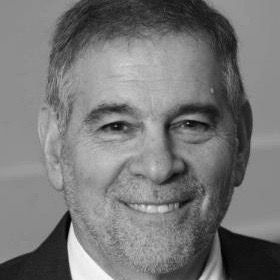 attends the USC Shoah Foundation Institute Ambassadors for Humanity Gala held at the Grand Ballroom at Hollywood & Highland Center on June 6, 2012 in Hollywood, California.
attends the USC Shoah Foundation Institute Ambassadors for Humanity Gala held at the Grand Ballroom at Hollywood & Highland Center on June 6, 2012 in Hollywood, California. Dario Gabbai, the last of the Sonderkommando — those prisoners forced to work in the vicinity of the gas chambers — died March 25, 2020, in Los Angeles, his home for the for the past 67 years. He was 97.
Born in Salonika, Greece, on Sept. 2, 1922, Gabbai was the son of an Italian, Victor (Chaim), and a Greek, Rosa Beraha Gabbai. His mother was traditional, deeply immersed in the intense Sephardic culture of the city. Salonika, whose ports were closed on the Sabbath until World War I, was called “the Jerusalem of the Balkans.” It was a community of approximately 65,000 Jews, with some 40 synagogues, a Jewish hospital and even a Jewish fire brigade. As a boy, Gabbai played the clarinet and began a life-long passion for athletics.
Shortly after the Germans invaded in April 1941, the Jewish community was ghettoized; most Jews were deported to Auschwitz in March 1943. Gabbai was deported a year later, along with his parents and his brothers, Jacob and Samuel; his younger sister had died in infancy. Along with him for the 11-day journey from Greece to Auschwitz in Poland were members of his extended family, including his cousins Shlomo and Maurice Venetzia. By then, Auschwitz had been in existence for almost four years and Birkenau, its killing center, had been operational for more than a year. Yet, Gabbai did not know the name “Auschwitz.”
Upon arrival, he faced selection: the old, the very young, women with children and those who were weak were sent to their deaths. Only the strong survived. His mother, father and brother Samuel were sent to the crematoria of Birkenau. Gabbai was young, seemingly strong. For Gabbai, that began his lifelong obsession with physical fitness. He had seen the weak die, day after day, week after week.
After a brief time, Gabbai and his brother Jacob, along with their cousins, were chosen to be Sonderkommando. They were chosen in part because Greek Jews were raised with Ladino, not Yiddish. Few spoke Yiddish, Polish or Hungarian, soon to become the largest population of Birkenau as some six weeks later, the Hungarian transports began: 437,402 Jews on 147 trains arrived from May 15 to July 8, 1944. This was an average of 2,950 Jews per train, with approximately three trains each day. About eight out of 10 prisoners were taken directly to the gas chambers, which, by then, were operating at full capacity — even beyond capacity as on some days, Jews were burned in open pits.
The Sonderkommando were intimate with the act of killing. They observed the murderers directly, closely, and over a long period of time. They were in the presence of the condemned in their last moments: when they entered the undressing room; when they lined up to go into the gas chambers; moments after they were gassed; when their bodies were removed from the chambers and they were processed — gold teeth were pulled, inner cavities were searched for hidden valuables, wedding and other rings were removed from fingers, and hair was shorn and bundled. They were with the remains of the victims as they were burned either in open pits or in the ovens of the crematoria.
Gabbai was not without guilt over his work. He said, “How can you have peace of mind? It is very, very tough. Inside of us, there is somebody else.”
Sonderkommando were slated to be murdered after some two or three months because they had seen too much and knew too much. Yet because of the intensity of the killing during the summer of 1944, Gabbai and his fellow Sonderkomando were kept alive. The chaos of the last period at Auschwitz allowed him, Jacob, Shlomo and Maurice to escape all-but-certain death.
He last returned to Auschwitz in 2015 on the 70th anniversary of its liberation, and walked to Crematoria II with Warren Reingold. He sang in Italian “Mama” as a tribute to those he had lost.
Gabbai was on the death march — what the Germans euphemistically called “forced evacuations” — from Auschwitz in January 1945, walking in the dead of winter with temperatures well below zero, then boarding a train that was to take him to Mauthausen. He developed an unusual strategy for getting through the endless march when, if you stumbled, rested or paused, you were shot. He said, “I closed my eyes and said, ‘How beautiful Athens is in the spring.’ ” He kept repeating this, again and again. Soon, he said, “I was sweating.”
The Americans liberated Gabbai from Ebensee, a sub-camp of Mauthausen, on May 6, 1945, two days before the end of the war. He weighed less than 100 pounds. Only 1.5% of the Sonderkommando survived. Few of those deported from Salonika survived, so he truly was (in the words of Isaiah) “a brand plucked from fire.”
After the war, he went to Athens and worked for the JDC. Gabbai came to the United States in March 1951, resettled by the Jewish community of Cleveland. As he recounted, he learned “that California had beautiful women, beautiful beaches and wonderful sunshine,” so he made his way out of Los Angeles and began what he thought would be a career in the movie business.
Dark and handsome, he had a role in the “The Glory Brigade” starring Victor Mature, Richard England and Lee Marvin about the Greek Spartan Brigade that fought alongside the Americans in Korea. He played one of the Greek soldiers but did not get screen credit. Gabbai noticed that young actors occasionally received parts; more often, they were on unemployment lines and waiting restaurant tables. He wanted a more stable career and began working with Lensol Fabrics, beginning as a salesman and successfully working there for 35 years. He became close to its owners, the Reingold family, whose son Warren spoke so beautifully at Gabbai’s funeral and was responsible for Gabbai in his declining years.
A cousin by marriage, Deborah Sturman, recalled that “he was also a successful businessman after the Shoah, and a much-loved member of his family. And he helped take care of his brother and his brother’s family when they were in Israel in the 1950s and 1960s, when things were so tough there. He also maintained close friendships with people he met right after the war until the end of his life. He was far more than only a survivor.”
Gabbai gave his testimony to the Shoah Foundation soon after it was founded. He was re-interviewed more than 20 years later and grew close to its staff as they worked on the film “The Last Days,” produced by June Beallor and Ken Lipper. Many of its veteran staff attended his funeral via Zoom.
Gabbai started to speak in schools all over the Los Angeles area and developed a special relationship with Claremont-McKenna College.
He did have a movie career — yet not in the manner he first imagined. He was featured in James Moll’s Academy Award-winning film “The Last Days.” Together with his cousins, his return to Auschwitz was featured in “Auschwitz: The Last Witness” and in a 2010 documentary called “Finding Nico,” which reunited him with his California roommate of the 1950s, Nico Minardos.
He married Dana Mitzman in 1953 and daughter Rhoda was born in 1957. Gabbai is survived by his daughter.
Gabbai bore witness time and again. He could not forget, yet he fought those memories. “It’s like a virus,” he said. “It lies dormant and then it comes back.” Only at the gym could he forget. “When I am sweating, everything goes away. Everything!”
He last returned to Auschwitz in 2015 on the 70th anniversary of its liberation, and walked to Crematoria II with Warren Reingold. He sang in Italian “Mama” as a tribute to those he had lost.
As a Sonderkommando, he was with the remains of those who were murdered as bones that had not been burned were crushed; the ashes were accumulated, then brought to the Vistula River, where they were deposited in the river to flow downstream and be scattered. Among those ashes were Gabbai’s immediate and extended family, those he knew, those he loved.
So even in these difficult times, we had the privilege of burying Gabbai in a Kever Yisrael. His body was washed and placed in shrouds; El Maleh Rahamim (“Oh Lord full of compassion”), the memorial prayer recited at a funeral, and the Kaddish are recited by the mourners, who, because we cannot share a shovel during these times, threw earth on his coffin.
He is at peace, at last.
Michael Berenbaum is a professor of Jewish studies and director of the Sigi Ziering Institute at American Jewish University in Los Angeles.























 More news and opinions than at a Shabbat dinner, right in your inbox.
More news and opinions than at a Shabbat dinner, right in your inbox.